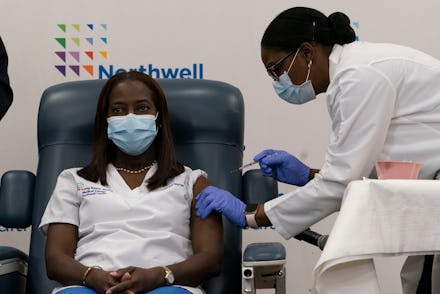The first person to receive the coronavirus vaccine in the U.S. was a Black woman ICU nurse

Over the weekend, the Food and Drug Administration approved Pfizer and BioNTech's coronavirus vaccine. Given that officials had anticipated the move for weeks, there was no hesitation when it came to getting those vaccines on the move. To start off the week, many Americans woke up to FedEx and UPS celebrating their first deliveries of the coronavirus vaccine. If it wasn't enough to know that deliveries are being made, vaccinations of priority populations like health care professionals have already begun, too.
A critical care nurse was among the first people to receive the coronavirus vaccine in the United States. CNN reported that Sandra Lindsay, an ICU nurse at Long Island Jewish Medical Center in Queens, New York, received the vaccine during a live video event. She will have to receive a second dose in 21 days, but it is still a pivotal moment.
"I'm feeling well. I would like to thank all the front-line workers, all my colleagues who have been doing a yeoman's job to fight this pandemic all over the world," Lindsay said afterward. "I feel hopeful today, relieved. I feel like healing is coming. I hope this marks the beginning of the end of a very painful time in our history."
Minutes after Lindsay was vaccinated, President Trump, who had taken to social media on Friday to pressure the FDA to approve the vaccine, tweeted about the moment.
The news of Lindsay's vaccination comes only hours after FedEx and UPS shared the news about their first vaccine deliveries. For some, the delivery companies and people involved in the vaccine's distribution may have gone without thought, but it is important to recognize their role, too. UPS called it a "whirlwind of a day" and added, "To our partners in the health care, logistics, and government sectors, and to the [UPSers] who made today's vaccine logistics possible ... thank you!"
In a statement, the president and chief operating officer of FedEx Corp, Raj Subramaniam, said, “This is among the most important work in the history of our company, and we’re honored to be a part of the effort to help end this pandemic. I am immensely proud of our dedicated team members who continue to go above and beyond to help ensure the safe movement of these critical COVID-19 vaccines. ... This is who we are and what we do at FedEx.”
Both Lindsay and the doctor who administered the shot, Dr. Michelle Chester, are Black. This is important to note given that many Black Americans have expressed hesitancy around receiving the coronavirus vaccine due to the history of medical abuse of Black people by the U.S. government. While the Trump administration failed to launch a comprehensive federal campaign, or even issue a statement, to acknowledge this pain, perhaps seeing Black women involved with the first vaccination will make some feel more comfortable receiving it.
Still, there are a lot of questions about who will be vaccinated next. Earlier this month, a Centers for Disease Control and Prevention panel recommended that health care workers like Lindsay and staff at long-term care facilities be prioritized. On Sunday, Trump nixed an earlier plan that apparently called for top government officials to be vaccinated first, tweeting, "People working in the White House should receive the vaccine somewhat later in the program, unless specifically necessary. I have asked that this adjustment be made. I am not scheduled to take the vaccine, but look forward to doing so at the appropriate time."
The vaccine's distribution will largely be left up to each state. So, there isn't an exact date nationwide for when it will be publicly available. However, Politico reported that the first vaccination in a pharmacy is expected to be carried out on Monday afternoon in Fenton, Michigan. And last week, Dr. Anthony Fauci predicted that if the U.S. could reach a vaccination rate of 75 to 80%, the country could achieve herd immunity by next fall.